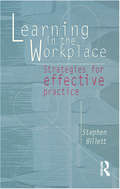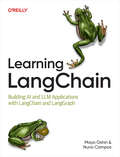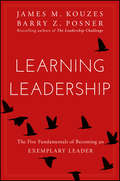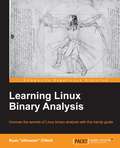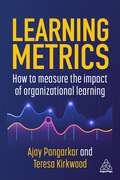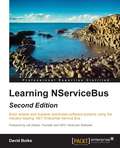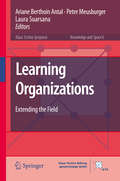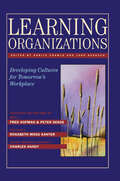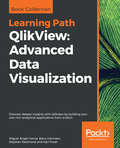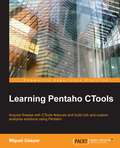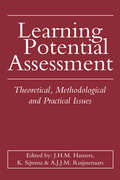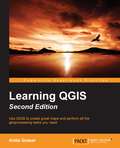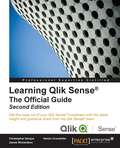- Table View
- List View
Learning IBM Watson Analytics
by James D MillerMake the most advanced predictive analytical processes easy using Watson Analytics with this easy-to-follow practical guide About This Book * This is the first and the only book on IBM Watson Analytics, and it shows you how to leverage Watson in an enterprise environment through rich use cases * Incorporate Watson Analytics into your business strategy and confidently add this cutting edge expertise to your resume * This book is written by James D Miller, IBM-certified expert and accomplished Director and Sr. Project Leader Who This Book Is For If you want to perform data discovery and analysis and make sense of data you have, this book for you. Data scientists can also use this book to explore a new way to perform data analysis tasks on cloud with ease. This book does not require a programming background. What You Will Learn * Study the language of Watson while you discover how easy it is to access and configure * Review what a Watson use case is, why it's important, and how to identify one * Design Watson Analytical solutions based upon your use cases * Understand the basic concepts behind the content analysis cycle and where Watson fits in * Explore all the features of Watson, such as Explore, Predict, and Assemble * Customize and extend your Watson solutions * Use Watson at the Enterprise level * Integrate Watson with other toolsets In Detail Today, only a small portion of businesses actually use a real analytical tool as part of routine decision making. IBM Watson Analytics is changing that making the most advanced and predictive analytical techniques understandable and usable for any industry. This book will be the vital tour guide for your trip, starting with what IBM Watson Analytics is. We'll start off with introduction to Watson Analytics and then quickly move on to various use cases under which one can use the different analytics functionalities offered by Watson. During the course of the book, you will learn how to design solutions, and customize and extend Watson analytics. We will conclude by taking Watson Analytics to enterprise and integrating it with other solutions (other IBM solutions and analytics). Now is the time for you to learn IBM Watson to compete in the world. Style and approach Watson provides individuals with the ability to perform sophisticated data discovery and analysis without all of the complexity that usually goes along with it. This book will get you started with Watson analytics and how you can use it in day-to-day data analysis. The book introduces the key concepts and terminology and then uses practical use case examples to reinforce your understanding.
Learning In The Workplace: Strategies for effective practice
by Stephen BillettLearning in the workplace has come of age with the publication of this book. It shows the way for a new level of sophistication in the ways learning and work are treated. And it opens new territory for exploration in the world of learning throughout life.David Boud, University of Technology, SydneyStephen Billett provides a comprehensive and practical model, well-grounded in theory and research, to guide learning in the workplace. This is a 'must read' for those in vocational education and training.Victoria Marsick, Columbia UniversityLearning does not stop when you leave school or tertiary studies, but continues throughout life. The workplace is now seen as an important learning environment, and businesses and government units are encouraged to become 'learning organisations'. This is all very well in theory, but how does learning actually occur in the workplace?Drawing on research of a wide variety of workplaces in different countries, Stephen Billett analyses the strengths and limitations of 'on-the-job' learning. He outlines what knowledge individuals need and how they can best acquire this knowledge in workplace settings. He shows how to develop a workplace curriculum, and how it can be implemented in organisations of different sizes. Learning in the Workplace offers a comprehensive pedagogy for the workplace. It is a valuable reference for human resource practitioners and students in courses on professional development and adult and vocational learning.
Learning Kibana 7: Build powerful Elastic dashboards with Kibana's data visualization capabilities, 2nd Edition
by Bahaaldine Azarmi Anurag SrivastavaA beginner's guide to analyzing and visualizing your Elasticsearch data using Kibana 7 and Timelion Key Features Gain a fundamental understanding of how Kibana operates within the Elastic Stack Explore your data with Elastic Graph and create rich dashboards in Kibana Learn scalable data visualization techniques in Kibana 7 Book Description Kibana is a window into the Elastic Stack, that enables the visual exploration and real-time analysis of your data in Elasticsearch. This book will help you understand the core concepts of the use of Kibana 7 for rich analytics and data visualization. If you're new to the tool or want to get to grips with the latest features introduced in Kibana 7, this book is the perfect beginner's guide. You'll learn how to set up and configure the Elastic Stack and understand where Kibana sits within the architecture. As you advance, you'll learn how to ingest data from different sources using Beats or Logstash into Elasticsearch, followed by exploring and visualizing data in Kibana. Whether working with time series data to create complex graphs using Timelion or embedding visualizations created in Kibana into your web applications, this book covers it all. It also covers topics that every Elastic developer needs to be aware of, such as installing and configuring Application Performance Monitoring (APM) servers and agents. Finally, you'll also learn how to create effective machine learning jobs in Kibana to find anomalies in your data. By the end of this book, you'll have a solid understanding of Kibana, and be able to create your own visual analytics solutions from scratch. What you will learn Explore the data-driven architecture of the Elastic Stack Install and set up Kibana 7 and other Elastic Stack components Use Beats and Logstash to get input from different data sources Create different visualizations using Kibana Build enterprise-grade Elastic dashboards from scratch Use Timelion to play with time series data Install and configure APM servers and APM agents Work with Dev Tools, Spaces, Graph, and other important tools Who this book is for If you're an aspiring Elastic developer or data analysts, this book is for you. You'll also find it useful if you want to get up to speed with the new features of Kibana 7 and perform data visualization on enterprise data. No prior knowledge of Kibana is expected, but some experience with Elasticsearch will be helpful.
Learning LangChain: Building AI and LLM Applications with LangChain and LangGraph
by Mayo Oshin Nuno CamposIf you're looking to build production-ready AI applications that can reason and retrieve external data for context-awareness, you'll need to master--;a popular development framework and platform for building, running, and managing agentic applications. LangChain is used by several leading companies, including Zapier, Replit, Databricks, and many more. This guide is an indispensable resource for developers who understand Python or JavaScript but are beginners eager to harness the power of AI.Authors Mayo Oshin and Nuno Campos demystify the use of LangChain through practical insights and in-depth tutorials. Starting with basic concepts, this book shows you step-by-step how to build a production-ready AI agent that uses your data.Harness the power of retrieval-augmented generation (RAG) to enhance the accuracy of LLMs using external up-to-date dataDevelop and deploy AI applications that interact intelligently and contextually with usersMake use of the powerful agent architecture with LangGraphIntegrate and manage third-party APIs and tools to extend the functionality of your AI applicationsMonitor, test, and evaluate your AI applications to improve performanceUnderstand the foundations of LLM app development and how they can be used with LangChain
Learning Leadership In A Changing World
by Mark W. MccloskeyLearning Leadership in a Changing World provides direction and support in the form of the 4R Model of Leadership--a theoretically sound, conceptually straightforward, and educationally powerful framework.
Learning Leadership: Führung lebenslang neu lernen
by Anja Ebert-SteinhübelDieses Fachbuch ist ein Plädoyer für ein neues, zeitgemäßes Führungs- und Lernverhalten, mit dem es gelingt, auf Veränderungen der durch Digitalisierung und Globalisierung geprägten Arbeitswelt flexibel zu reagieren. Die Autorin demonstriert, dass Führen und lebenslanges Lernen unlösbar miteinander verbunden sind: Leadership kann und muss gelernt werden und ist Teil eines unternehmensweiten Lernprozesses. Lernen wiederum benötigt Führung, d.h. klare Entscheidungen, inspirierende Ziele und eine überzeugende Kommunikation, sowie die nötigen technischen, strukturellen und kulturellen Voraussetzungen einer auf Wandel ausgerichteten Organisation. Die Autorin eröffnet Führungskräften eine neue Perspektive im Hinblick auf die Handlungsfelder Organisation, Team und (Führungs-)Persönlichkeit und fordert zum Weiterdenken und -lernen auf. Das Buch beinhaltet eine konkrete Agenda des Lernens für unterschiedliche Führungstypen und -situationen und zeigt auf, wie die Verbindung zwischen individuellem, organisationalem und gesellschaftlichem Lernen gelingt.
Learning Leadership: The Five Fundamentals of Becoming an Exemplary Leader
by James M. Kouzes Barry Z. PosnerFrom the bestselling authors of The Leadership Challenge and over a dozen award winning leadership books, James M. Kouzes and Barry Z. Posner have written a new book that examines a fundamental question: How do people learn leadership? How do they learn to become leaders? Learning Leadership: The Five Fundamentals of Becoming an Exemplary Leader (ISBN: 978-1-119-14428-1; Wiley; May 2016) is a comprehensive guide to unleashing the inner-leader in us all and to building a solid foundation for a lifetime of leadership growth and mastery. The book offers a concrete framework to help individuals of all levels, functions, and backgrounds take charge of their own leadership development and become the best leaders they can be. Arguing that all individuals are born with the capacity to lead, Kouzes and Posner provide readers with a practical series of actions and specific coaching tips for harnessing that capacity and creating a context in which they can excel., Supported by over 30 years of research, from over seventy countries, and with examples from real-world leaders, Learning Leadership is a clarion call to unleash the leadership potential that is already present in today's society. According to Kouzes and Posner, "Leadership makes a significant difference in levels of engagement and commitment and is perhaps the most important asset in every organization, yet recent research points to a shortage of leaders. It is a serious global concern. The world needs more exemplary leaders in order to promote high-performing workplaces and inspire feelings of greater self-worth and meaningfulness. The shortage, however, is not because of the lack of potential talent. The people are out there, the eagerness is out there, and the capability is out there. The shortage results from prevailing myths--myths about talent, strengths, position, self-reliance, and effort--that inhibit the vast majority of leaders from shining and organizations from realizing the full benefits of the talent they already have." Learning Leadership provides readers with evidence-based strategies to ignite the habit of continuous improvement and the mindset of becoming the best leaders they can be. Emerging leaders, as well as leadership developers, internal and external coaches and trainers, and other human resource professionals will learn from first-hand stories and practical examples so that they can deeply understand and apply the fundamental for becoming the best leaders they can be. Learning Leadership: The Five Fundamentals of Becoming an Exemplary Leader is divided into digestible bite-sized chapters that encourage daily actions to becoming a better leader. Key takeaways from the book include: Believe in Yourself. Believing in oneself is the essential first step in developing leadership competencies. The best leaders are learners, and they can't achieve mastery until and unless they truly decide that inside them there is a person who can make and difference and learn to be a better leader than they are right now. Aspire to Excel. To become an exemplary leader, people have to determine what they care most about and why they want to lead. Leaders with values-based motivations are the most likely to excel. They also must have a clear image of the kind of leader they want to be in the future--and the legacy they want to leave for others. Challenge Yourself. Challenging oneself is critical to learning leadership. Leaders have to seek new experiences and test themselves. There will be inevitable setbacks and failures along the way that require curiosity, grit, courage, and resilience in order to persist in learning and becoming the best. Engage Support. <
Learning Linux Binary Analysis
by Ryan O'NeillIf you are a software engineer or reverse engineer and want to learn more about Linux binary analysis, this book will provide you with all you need to implement solutions for binary analysis in areas of security, forensics, and antivirus. This book is great for both security enthusiasts and system level engineers. Some experience with the C programming language and the Linux command line is assumed.
Learning Magento 2 Administration
by Bret Williams Cyndi WilliamsMaximize the power of Magento 2 to improve your e-commerce business About This Book * Strategic planning for maximizing your Magento 2 store's operations and sales. * Important guidelines and advice for optimizing your Magento 2 store. * Packed with screenshots and step-by-step instructions to leverage the hundreds of Magento 2 features. Who This Book Is For This guide is for store owners who use Magento 2 on a daily basis to operate their online stores. Proprietors will use this guide as a reference for ensuring that they are utilizing the full power of Magento 2. Developers and solution providers will find this guide a helpful tool in identifying opportunities to help their clients navigate the complexity of Magento 2. What You Will Learn * Strategies for creating multiple stores within a single Magento installation. * Use of complex product types such as bundles, downloadables and virtual products. * Configuring payments, shipping and taxes. * Accommodating multiple languages and currencies. * Installing and configuring themes. * Managing content and search engine optimization. * Creating promotions, up-sells and cross-sells. * Leveraging the customer relationship features of Magento 2. * Securing and optimizing your installation. In Detail Magento 2 has been completely re-written and re-designed to take the world's most popular open source e-commerce platform to new heights of productivity and usability. With this overhaul comes improved opportunities to leverage the world's most successful open source e-commerce platform for your online retail and wholesale business. The focus of this book is on operational aspects: those actions you, as a proprietor, can take to give your customers a more delightful shopping experience. In this guide, we delve into all aspects of managing a Magento 2 store, from product creation to marketing, customer management to search engine optimization. This book is not only a step-by-step course in setting up your Magento 2 website, it will be a handy reference as continue to improve and refine your online presence. Style and approach A step-by-step guide where it takes the reader from the planning step all the way through launching a new Magento-powered store by building on the initial sample data included in a default Magento 2 installation. Along the way, we explore using discrete action steps how to leverage the full power of Magento 2 for both simple and advanced uses. Screenshots and step-by-step instructions not only teach the new Magento store administrator, but also serve as a handy reference for the more experienced operators.
Learning Metrics: How to Measure the Impact of Organizational Learning
by Ajay Pangarkar Teresa KirkwoodHow do I know if Learning and Development (L&D) initiatives are making a difference to employee and business performance? What should I measure and how do I take a data-driven approach?Learning Metrics is a practical book for L&D professionals which answers these questions and provides guidance for measuring and communicating the impact of L&D activity in the business. It covers how to measure participant engagement with learning, learning retention and changes in employee performance post-learning. There is also guidance on how to measure on-the-job behaviour change as a result of learning, as well as metrics for measuring the organizational impact of learning. This book also has essential guidance on how to use learning analytics to assess the return on investment (ROI) of learning and how to use these results to adopt a data-driven approach and map learning metrics to organizational KPIs. Learning Metrics also includes guidance on how to communicate the impact of the company's learning and development activity to all business stakeholders. Full of practical guidance, examples, advice and case studies from organizations including Pfizer, Goldman Sachs, HSBC, Merck and Hewlett Packard, this is essential reading for all L&D professionals needing to measure the impact of L&D activity in the business but not sure where to start.
Learning Microsoft Power Apps: Building Business Applications with Low-Code Technology
by Arpit ShrivastavaIn today's fast-paced world, more and more organizations require rapid application development with reduced development costs and increased productivity. This practical guide shows application developers how to use PowerApps, Microsoft's no-code/low-code application framework that helps developers speed up development, modernize business processes, and solve tough challenges.Author Arpit Shrivastava provides a comprehensive overview of designing and building cost-effective applications with Microsoft Power Apps. You'll learn fundamental concepts behind low-code and no-code development, how to build applications using pre-built and blank templates, how to design an app using Copilot AI and drag and drop PowerPoint-like controls, use Excel-like expressions to write business logic for an app, and integrate apps with external data sources.With this book, you'll:Learn the importance of no-code/low-code application developmentDesign mobile/tablet (canvas apps) applications using pre-built and blank templatesDesign web applications (model-driven apps) using low-code, no-code, and pro-code componentsIntegrate PowerApps with external applicationsLearn basic coding concepts like JavaScript, Power Fx, and C#Apply best practices to customize Dynamics 365 CE applicationsDive into Azure DevOps and ALM concepts to automate application deployment
Learning Microsoft Power Automate: Improving Productivity for Business Processes and Workflows
by Paul Papanek StorkProcessing information efficiently is critical to the successful operation of modern organizations. One particularly helpful tool is Microsoft Power Automate, a low-code/no-code development platform designed to help tech-savvy users create and implement workflows. This practical book explains how small-business and enterprise users can replace manual work that takes days with an automated process you can set up in a few hours using Power Automate.Paul Papanek Stork, principal architect at Don't Pa..Panic Consulting, provides a concise yet comprehensive overview of the foundational skills required to understand and work with Power Automate. You'll learn how to use these workflows, or flows, to automate repetitive tasks or complete business processes without manual intervention.Whether you're transferring form responses to a list, managing document approvals, sending automatic reminders for overdue tasks, or archiving emails and attachments, these skills will help you:Design and build flows with templates or from scratchSelect triggers and actions to automate a processAdd actions to a flow to retrieve and process informationUse functions to transform informationControl the logic of a process using conditional actions, loops, or parallel branchesImplement error checking to avoid potential problems
Learning Microsoft Power BI: Transforming Data into Insights
by Jeremey ArnoldMicrosoft Power BI is a data analytics and visualization tool powerful enough for the most demanding data scientists, but accessible enough for everyday use for anyone who needs to get more from data. The market has many books designed to train and equip professional data analysts to use Power BI, but few of them make this tool accessible to anyone who wants to get up to speed on their own.This streamlined intro to Power BI covers all the foundational aspects and features you need to go from "zero to hero" with data and visualizations. Whether you work with large, complex datasets or work in Microsoft Excel, author Jeremey Arnold shows you how to teach yourself Power BI and use it confidently as a regular data analysis and reporting tool.You'll learn how to:Import, manipulate, visualize, and investigate data in Power BIApproach solutions for both self-service and enterprise BIUse Power BI in your organization's business intelligence strategyProduce effective reports and dashboardsCreate environments for sharing reports and managing data access with your teamDetermine the right solution for using Power BI offerings based on size, security, and computational needs
Learning Microsoft Windows Server 2012 Dynamic Access Control
by Jochen NickelThis practical tutorial-based book is filled with information about the architecture, functionality, and extensions of Microsoft Windows Server 2012 Dynamic Access Control.If you are an IT consultant/architect, system engineer, system administrator, or security engineers planning to implement Dynamic Access Control in your organization, or have already implemented it and want to discover more about the abilities and how to use them effectively, this book will be an essential resource. You should have some understanding of security solutions, Active Directory, Access Privileges/ Rights and Authentication methods, and a fundamental understanding of Microsoft technologies. Programming knowledge is not required but can be helpful for using PowerShell or the APIs to customize your solution.
Learning Modern C++ for Finance: Foundations for Quantitative Programming
by Daniel HansonThis practical book demonstrates why C++ is still one of the dominant production-quality languages for financial applications and systems. Many programmers believe that C++ is too difficult to learn. Author Daniel Hanson demonstrates that this is no longer the case, thanks to modern features added to the C++ Standard beginning in 2011.Financial programmers will discover how to leverage C++ abstractions that enable safe implementation of financial models. You’ll also explore how popular open source libraries provide additional weapons for attacking mathematical problems. C++ programmers unfamiliar with financial applications also benefit from this handy guide.Learn C++ basics from a modern perspective: syntax, inheritance, polymorphism, composition, STL containers, and algorithmsDive into newer features and abstractions including functional programming using lambdas, task-based concurrency, and smart pointersImplement basic numerical routines in modern C++Understand best practices for writing clean and efficient code
Learning NServiceBus - Second Edition
by David BoikeIf you are a .NET developer who wants to eliminate the problems related to defective third-party web service integration or batch job failures, then this is the book for you. It is also perfect for those of you who are new to NServiceBus and service-oriented architecture and would like to learn how you can streamline all of your development efforts.
Learning Organizations
by Peter Meusburger Ariane Berthoin Antal Laura SuarsanaThis book is designed to extend the field of organizational learning in several ways. The contributors from three continents bring different perspectives on processes and outcomes of knowledge creation and sharing in and between organizations in diverse contexts. They use approaches and concepts from numerous disciplines including the arts, economics, geography, organizational studies, psychology, and sociology. The contributions enrich the spatial turn in organization studies by offering fresh insights for researchers who seek to attend to the contextual dimensions of the phenomena they are studying. They provide examples of organizational places and spaces that have not yet received sufficient attention, as diverse as temporary international organizations and computer screens.
Learning Organizations: Developing Cultures for Tomorrow's Workplace
by John Renesch Sarita ChawlaWhat is a learning organization? What are the advantages of creating one? Why should a company want to become a learning organization? Where does one start?Learning Organizations: Developing Cultures for Tomorrow's Workplace contains essays by thirty-nine of the most respected practitioners and scholars of this topic. This definitive collection of essays is rich in concept and theory as well as application and example. Lead authors include Harvard's Rosabeth Moss Kanter, London Business School's Professor Emeritus Charles Handy, and MlT's Fred Kofman and Peter Senge. The thirty-two essays in this comprehensive collection are presented in four main parts: 1. Guiding Ideas 2. Theories/Methods/Processes 3. Infrastructure 4. Arenas of Practice
Learning Path - QlikView: Advanced Data Visualization
by Miguel Angel Garcia Barry Harmsen Stephen Redmond Karl PoverThis Learning Path is designed for developers who want to go beyond their technical knowledge of QlikView and understand how to create analysis and data visualizations that solve real business needs. To grasp the concepts explained in this Learning Path, you should have a basic understanding of the common QlikView functions and some hands-on experience with the tool.
Learning Pentaho CTools
by Miguel GasparAcquire finesse with CTools features and build rich and custom analytics solutions using Pentaho About This Book * Learn everything you need to know to make the most of CTools * Create interactive and remarkable dashboards using the CTools * Understand how to use and create data visualizations that can make the difference * The author of our book works for Pentaho as a Senior Consultant * Acts as a follow-up to Packt's previously published products on Pentaho such as Pentaho Business Analytics Cookbook, Pentaho Analytics for MongoDB, Pentaho Data Integration Cookbook - Second Edition, and Pentaho Reporting [Video] * Our book is based on the latest version of Pentaho, that is, 6.0 Who This Book Is For If you are a CTools developer and would like to expand your knowledge and create attractive dashboards and frameworks, this book is the go-to-guide for you. A basic knowledge of JavaScript and Cascading Style Sheets (CSS) is highly recommended. What You Will Learn * Install Community Tools on Pentaho; and understand the necessary concepts and considerations when creating an exciting dashboard design * Get data from many different Pentaho datasources and deliver it in different formats (CSV, XLS, XML, or JSON) * Use the Community Data Access (CDA) as the data abstraction layer and understand the concepts in the Community Dashboard Framework (CDF) * Create a Community Dashboard Editor (CDE) dashboard and make the most of the main components * Create and make use of widgets and use duplicate components to have data-driven sections on the dashboard * Customize and create interaction between all components, including charts, using the Community Charts Components * Create and embed dashboards in a better and new way * Create plugins and make use of parameters inside Pentaho without writing code In Detail Pentaho and CTools are two of the fastest and most rapidly growing tools for practical solutions not found in any other tool available on the market. Using Pentaho allows you to build a complete analytics solution, and CTools brings an advanced flexibility to customizing them in a remarkable way. CTools provides its users with the ability to utilize Web technologies and data visualization concepts, and make the most of best practices to create a huge visual impact. The book starts with the basics of the framework and how to get data to your dashboards. We'll take you all the way through to create your custom and advanced dashboards that will create an effective visual impact and provide the best user experience. You will be given deep insights into the lifecycle of dashboards and the working of various components. Further, you will create a custom dashboard using the Community Dashboards Editor and use datasources to load data on the components. You will also create custom content using Query, the Freeform Addins Popup, and text components. Next, you will make use of widgets to create similar sections and duplicate components to reproduce other components on a dashboard. You will then learn to build a plugin without writing Java code, use Sparkl as a CPK plugin manager, and understand the application of deployment and version control to dashboard development. Finally, you will learn tips and tricks that can be very useful while embedding dashboards into other applications. This guide is an invaluable tutorial if you are planning to use custom and advanced dashboards among the solutions that you are building with Pentaho. Style and approach This book is a pragmatic, easy-to-follow guide that provides theoretical concepts, ideas, and tricks to better understand the necessary theoretical concepts. It also provides you with a set of highly intriguing samples of dashboards with customized code within them that can be utilized for future projects.
Learning Potential Assessment
by J.H.M. HamersLearning potential assessment, which has lately been receiving a great deal of attention, consists of test procedures for measuring children's learning potential procedures that be regarded as an extension of current intelligence testing.
Learning PowerCLI
by Robert Van Nieuwendijk"Learning PowerCLI" is written in a friendly and practical style with a focus on getting you started and automating daily tasks quickly and efficiently. If you manage or administrate a vSphere environment, and want to make that easier and more efficient, then this book is for you! This book is ideal for you if you want to learn how to automate your VMware vSphere infrastructure, by getting the most out of PowerCLI. It's assumed that you have some experience in administrating a VMware vSphere environment. Knowledge of Microsoft's Windows PowerShell is not a prerequisite.
Learning Practical FinTech from Successful Companies
by Yoshitaka KitaoThe FinTech Revoluiton is upon us in financial services In the past, the infrastructure referred to as banks was necessary, but IT companies like Amazon and Google that possess big data can handle operations such as payments even better than banks. Furthermore, linking AI to IoT is leading to a growing range of completely new business opportunities. This new phenomenon is gnerally called FinTech, and countries through the world are competing and creating opportunities rleated to how FinTech will evolve. The question becomes how the various perspectives and ventures will be realized in the future. This book provides deep insights into the transition from FinTech 1.0 to 1.5, and then on to FinTech 2.0, and what it means for financial intermediaries and their customers.
Learning QGIS - Second Edition
by Anita GraserThis book is great for users, developers, and consultants who know the basic functions and processes of GIS but want to learn to use QGIS to analyze geospatial data and create rich mapping applications. If you want to take advantage of the wide range of functionalities that QGIS offers, then this is the book for you.
Learning Qlik Sense®: The Official Guide - Second Edition
by James Richardson Henric Cronstrom Christopher IlacquaGet the most out of your Qlik Sense investment with the latest insight and guidance direct from the Qlik Sense team About This Book * Updated with new coverage on Qlik Cloud, Qlik Sense Modeling, and Extending the Qlik Analytic Platform. * Get insider insight on Qlik Sense and its new approach to business intelligence * Explore practical demonstrations for utilizing Qlik Sense to discover data for sales, human resources, and more Who This Book Is For Learning Qlik Sense®: The Official Guide Second Edition is for anyone seeking to understand and utilize the revolutionary new approach to business intelligence offered by Qlik Sense. Familiarity with the basics of business intelligence will be helpful when picking up this book, but not essential. What You Will Learn * Understand the vision behind the creation of Qlik Sense, and the promise that data discovery offers to you and your organization * Get to grips with the life cycle of a Qlik Sense application * Load and manage your data for app creation * Visualize your data with Qlik Sense's engaging and informative graphing * Administer your Qlik Sense system and monitor its security * Build efficient and responsive Associative Models * Extend the Qlik Analytic Platform with the Dev Hub * Optimize Qlik Sense for sales, human resources, and demographic data discovery In Detail The intuitive and powerful Qlik Sense visual analytics software allows anyone to engage in data discovery, to explore your data, and find meaningful insights to empower your business. Qlik Sense lets you easily create personalized reports and visualizations and reveal essential connections to show new opportunities from every angle. Written by members of the Qlik Sense team, this book is the official guide from Qlik to understanding and using their powerful new product with fully updated coverage to the latest features of the most modern edition of Qlik Sense. Benefit from the vision behind the development of Qlik Sense and get to grips with how Qlik Sense can empower you as a data discovery consumer. Learn how to create your own applications for Qlik Sense to customize it to meet your personal needs for business intelligence, and how to oversee and administer the Qlik Sense data architecture. Finally, explore utilizing Qlik Sense to uncover essential data, with practical examples on finding and visualizing intelligence for sales figures, human resources information, travel expense tracking, and demographic data discovery. Style and approach This book is a practical guide to understand what Qlik Sense is and how to implement it. This is an example-rich, step-by-step book to implement and optimize Qlik Sense for sales, human resources, and demographic data discovery.

